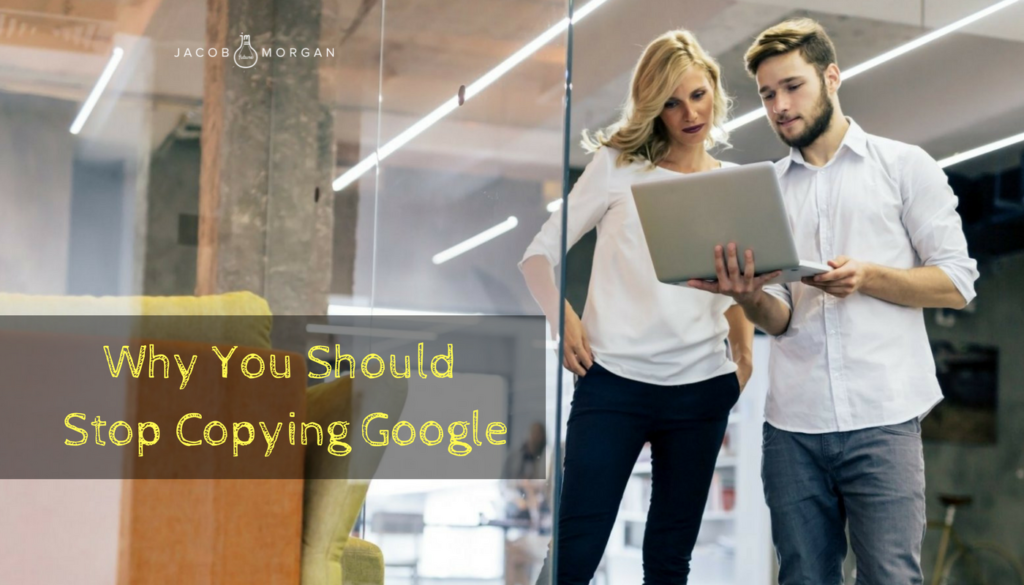
Imagine working for a place that had unlimited free food, free rides to and from work, unlimited tech support, innovation labs, long maternity leave, the ability to bring your dog to work, and much more. Almost sounds too good to be true, doesn’t it? But believe it or not, that’s everyday life for employees of Google. Many other companies, like Netflix, Amazon, and Facebook, are also known for their amazing work environment and employee perks. It can be tempting for other companies to want to follow in their footsteps and do everything like Google and these other companies. But copying a company like Google or Facebook can actually hurt your company’s culture and employee experience.
It may seem a little counterintuitive–after all, why wouldn’t you want to follow these places that are consistently recognized as some of the best places to work? The problem is that mindlessly copying Google takes away the originality and importance of the ideas. So many companies do exactly what Google does simply because Google is doing it; if Google started offering free skydiving classes to its workers, these companies would blindly follow in its footsteps. But the key to Google’s success isn’t in the free food and health and wellness programs it offers, it’s in the fact that it listens to its employees. Google has asked its employees what is important to them, listened, and put those ideas into actions. The outward expression of work perks is actually just showcasing the internal nature of Google’s culture and employee experience–that it values its employees and wants to create an environment where they are supported and can thrive.
Following others companies blindly kills your company’s unique features. Your company isn’t like Google, and that’s ok–tap into the features that makes your company stand out. If the blind copying keeps up, we’ll end up with a series of Google and Netflix clones with no real originality or creative ideas among other companies. These successful companies have built a strong employee experience because they talk to their employees and know what’s important to them. They aren’t offering these perks and programs to be trendy, but rather because it plays into a bigger strategy for happy employees and satisfied customers. Decisions aren’t made lightly–they use data and people analytics to find the perfect solution and one that is based in facts and evidence that it will be successful and drive revenue and boost morale. Companies like Amazon and Netflix know exactly how much money is going into their employee programs, the reasoning behind each perk, and what it is bringing back to the company. These programs are strategic and based on facts and numbers, not just what other companies are doing.
Just like copying the moves of a professional athlete doesn’t automatically make you a professional athlete, copying the programs of another company doesn’t automatically mean you’ll be successful. If you’re going to copy Google, copy how the company interacts with its employees to choose perks that fit the company’s culture and contribute to its growth. Start an ongoing conversation with your employees to find out what’s important to them, what they value, and how they want to feel at work. From there, you can create programs that are tailored to your company and its unique needs. Some of the perks and programs might be the same as Google, but you’ll know that they are right for your company because it is what your employees want. Tap into your data resources to back up the findings and fuel strategic growth through an improved employee experience.
Everyone wants to be as successful as Google, but the secret isn’t in the company’s programs but rather in its internal processes. Listen to your employees and focus on what makes you unique and you’ll go far.
Learn more on why your organization should create unique experiences here.
My new book, The Employee Experience Advantage (Wiley) analyzes over 250 global organizations to understand how to create a place where people genuinely want to show up to work. Get my free training series to create powerful Employee Experiences, or become a member of the new Facebook Community The Future If… and join the discussion.
